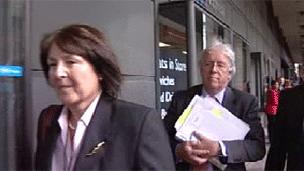Tax letters: New concession over highest demands
- Published

Dame Lesley Strathie and Dave Hartnett appeared before the Treasury Committee
A new concession will mean many people facing the highest demands for back-tax will not face interest payments.
Those given time to pay more than ВЈ2,000 in underpaid tax will now have interest waived - in line with those with smaller demands, MPs were told.
The Permanent Secretary for Tax, Dave Hartnett, told the Treasury Committee that the authorities "could have done better" to prepare people for bills.
More than two million people underpaid income tax in the past two tax years.
This was the result of errors in their Pay As You Earn (PAYE) tax code.
About 900,000 taxpayers will not have to pay anything after the government raised the write-off threshold from ВЈ50 to ВЈ300, a concession costing the Treasury ВЈ160m.
This left 1.4 million people owing about ВЈ2bn, or ВЈ1,428 each on average.
Letters
Dave Hartnett was appearing before the MPs on the Treasury Committee, together with Dame Lesley Strathie, HM Revenue and Customs (HMRC) chief executive, and Bernadette Kenny, director general of personal tax.
In a significant change in policy announced at the committee, Dame Lesley said that people who owed more than ВЈ2,000 in tax in the latest round would not have to pay interest if the tax authority gave them extra time to pay.
Before the concession, people had three months to pay up after which point they would be charged interest on the money owed.
"Where people need time to pay, they will not be charged interest," she said.
Ministers had asked for the change, and there is currently no estimate of the cost of the concession to the Treasury.
Mr Hartnett explained that the concession was designed to give the same treatment to all taxpayers, whatever they owed. However people must tell their tax office that they need time to pay - and get a repayment plan - in order for the concession to apply.
Dame Lesley - who noted that the PAYE system broadly worked for more than 80% of PAYE taxpayers - said that she had "empathy" for those facing underpayments and wished to make it as easy as possible for them to pay.
She acknowledged that the backlog of unresolved income taxes could mean that more people would receive letters about overpayment or underpayment of tax. A recent Audit Commission report said that there were 18.2 million unresolved income tax cases on HMRC's books, but not all of these would lead to a change in tax calculations.
Mr Hartnett added that HMRC needed to improve communications with its customers.
Timetable
Some 45,000 customers have been receiving letters from HMRC and 14,000 have so far cashed refunds as they had overpaid tax.
Dame Lesley said that a decision would be made later in September over how and when the remaining letters would be sent out.
Dame Lesley told the committee that in her estimation, 15% of unresolved cases from 2008-10 might lead to a refund of tax and 3% could lead to a tax demand.
Committee chairman Andrew Tyrie told the HMRC representatives: "We hope you have stabilised the problem."
He said the committee would now consider whether to conduct an inquiry into the workings of HMRC in the medium-term.